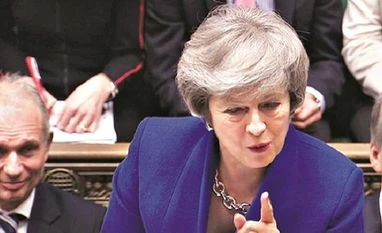British Prime Minister Theresa May on Wednesday said the country will be leaving the European Union on March 29, and that the bloc would only consider extending the ‘Article 50’ negotiating period if there was a credible alternative exit plan.
“The government’s policy is that we are leaving the European Union on the 29th of March. But the EU would only extend Article 50 if actually it was clear that there was a plan that was moving towards an agreed deal,” she told parliament, a day after her proposed Brexit deal was rejected by a large margin.
Meanwhile, German business daily Handelsblatt reported, citing diplomatic sources in Brussels, said the EU may make further concessions to Britain regarding the border between Northern Ireland and EU member Ireland.
The euro hit a seven-week low against the pound and fell against the US dollar on Wednesday, pushed lower by worries about the euro zone economy after May’s crushing defeat left the country’s exit from the EU in disarray just 10 weeks before it is due to leave.
Although the pound had sunk by more than 1 per cent against the dollar earlier in the day, it rallied as May’s heavy defeat was seen forcing Britain to pursue different options.
“One thing seems clear - this deal they voted on is now dead, I doubt they can make a few tweaks and salvage it,” said Richard Falkenhall, a senior FX strategist at SEB.
“You have to look at alternatives to them: there is no support in parliament for a no-deal Brexit so you end with a softer Brexit, or maybe even a second referendum,” he said.
As a consequence, the single currency fell as much as 0.3 per cent against the pound in early trade, hitting a seven-week low of 88.44 pence, and was trading at around 88.57 pence by 1200 GMT, down 0.20 per cent on the day.
The euro also dropped 0.3 per cent against the dollar to its lowest since January 4 at $1.1378, compressed by worries over the euro zone’s economic outlook.
Earlier this week, data showed Germany barely escaped a recession in the second half of 2018 and European Central Bank chief Mario Draghi warned on Tuesday the euro zone economy was weaker than expected.
On Brexit, a high degree of uncertainty has to be factored into market projections, others warned.
“Everything remains possible: new elections, an extension of the deadline for Article 50, or even a second referendum,” said Stefan Kreuzkamp, chief investment officer at DWS.
“Like many of our peers, we continue to hope for an orderly exit of the United Kingdom from the EU. But the path to get there remains unclear, and in any case cobbled with plenty of hurdles.”
The dollar eased 0.1 per cent to 108.80 yen after advancing 0.5 per cent against its Japanese peer overnight, amid a further ebb in risk aversion with US stocks posting strong gains.
The Swiss franc, which tends to gain in times of political tensions and market turmoil along with the yen, was a touch weaker at 0.99 franc per dollar.
The dollar index against a basket of six major currencies was marginally higher at 96.146 edging towards an 11-day high of 96.261 hit the day before.
The Turkish Lira, meanwhile, strengthened nearly 1 per cent to 5.45 liras per dollar after the country’s central bank left rates unchanged but said it would tighten monetary policy further if needed.
Unlock 30+ premium stories daily hand-picked by our editors, across devices on browser and app.
Pick your 5 favourite companies, get a daily email with all news updates on them.
Full access to our intuitive epaper - clip, save, share articles from any device; newspaper archives from 2006.
Preferential invites to Business Standard events.
Curated newsletters on markets, personal finance, policy & politics, start-ups, technology, and more.
)